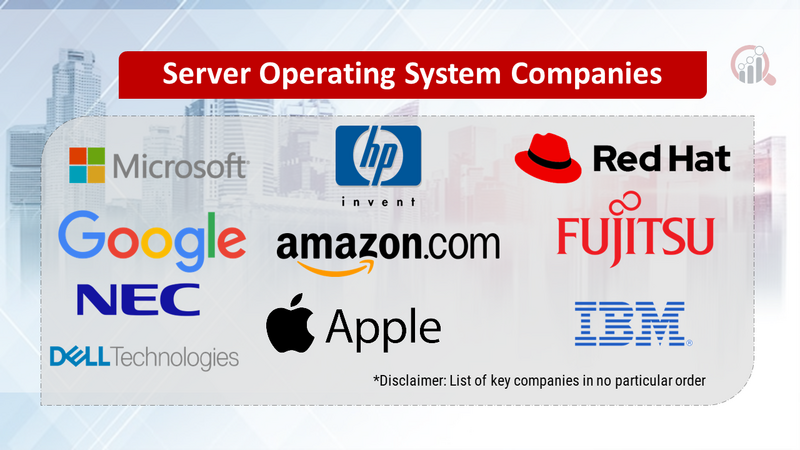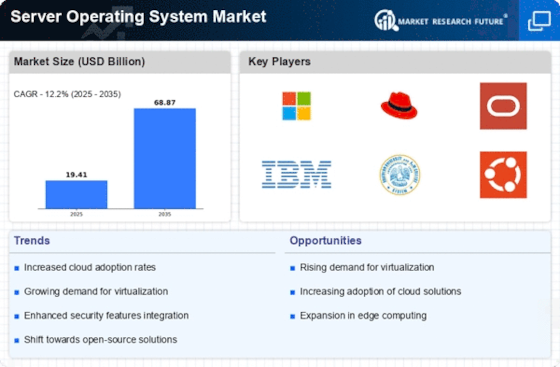Top Industry Leaders in the Server Operating System Market
 Competitive Landscape of Server Operating Systems
Competitive Landscape of Server Operating Systems
The server operating system (OS) market, the beating heart of data centers and cloud computing, is a fiercely contested battlefield. Established giants fight tooth and nail against nimble innovators, all vying for control of the software that powers the digital world. Let's delve into the intricacies of this dynamic landscape, exploring key players, strategic maneuvering, market share determinants, and emerging trends.
Key Players:
- Microsoft Corporation (U.S.)
- Red Hat Inc.(U.S.)
- IBM Corporation (U.S.)
- Google LLC (U.S.)
- Amazon Web Services, Inc. (U.S.)
- Fujitsu Ltd. (Japan)
- NEC Corporation (Japan)
- Apple Inc. (U.S.)
- Hewlett Packard Enterprise (U.S.)
- Dell Technologies Inc. (U.S.)
- Canonical Ltd. (U.K.)
Strategic Playbook:
Each player employs distinct strategies to carve out their niche:
-
Ecosystem Expansion: Building a robust ecosystem of partners and add-on software strengthens the overall value proposition and attracts customers seeking comprehensive solutions.
-
Cloud Focus: Adapting to the cloud computing paradigm through hybrid and multi-cloud solutions is crucial for capturing the rapidly growing cloud market share.
-
Open Source Embracing: Established players like Microsoft are increasingly collaborating with open-source communities and incorporating open-source components to expand their reach and cater to developer preferences.
-
Vertical Specialization: Tailoring offerings to specific industry needs, such as high-frequency trading in finance or real-time analytics in healthcare, helps players stand out in niche markets.
Market Share Metrics:
Determining market share in this multi-faceted landscape requires considering several factors:
-
Revenue Share: While straightforward, this metric might not paint the entire picture as some players offer free or open-source options.
-
Installed Base: The number of servers running a specific OS provides a clearer picture of market penetration, especially for enterprise deployments.
-
Cloud Adoption: The share of cloud workloads running on a particular OS offers insight into future growth potential.
-
Developer Community: The size and activity of the developer community supporting an OS reflects its long-term viability and innovation potential.
New Blood on the Rise:
Emerging players are shaking up the established order:
-
Container-Focused OSes: Lightweight options like Docker Enterprise and CoreOS, optimized for containerized workloads, are gaining traction in cloud-native environments.
-
Microkernel-Based Systems: Fuchsia, backed by Google, offers a modular and secure architecture, potentially appealing to security-conscious organizations.
-
Specialized Distributions: Niche Linux distributions, such as Rocky Linux (a CentOS fork) and SteamOS for gaming servers, cater to specific user groups and hardware configurations.
Investment Trends:
The future of the server OS market hinges on ongoing investments in key areas:
-
Artificial Intelligence (AI) and Machine Learning (ML): Integrating AI and ML capabilities into OSes for automated management, predictive maintenance, and workload optimization is a burgeoning trend.
-
Security Enhancements: With cyber threats escalating, advancements in data protection, threat detection, and vulnerability management are critical for securing critical infrastructure.
-
Cloud-Native Development: Adapting to the evolving cloud landscape through containerization support, Kubernetes integration, and serverless computing solutions is imperative for staying relevant.
-
Open Source Collaboration: Fostering open-source communities and contributing to open-source projects strengthens innovation and attracts developer talent.
The Road Ahead:
The server OS market is far from static. As technology evolves and user needs change, the battle for dominance will continue. Players who successfully adapt their strategies, embrace innovation, and cater to specific niches will be best positioned to capture market share and shape the future of the digital infrastructure.
Latest Company Updates:
- October 17, 2023: Microsoft announced the general availability of Windows Server 2026, highlighting security enhancements and hybrid cloud capabilities.
- September 29, 2023: Canonical, the company behind Ubuntu, released Ubuntu 23.10 with improved performance and security features.
- September 20, 2023: SUSE announced the availability of SUSE Linux Enterprise Server 16 SP4, emphasizing containerization and hybrid cloud integration.










